LAWS20060: Taxation Law of Australia Assignment - Term 1 2019
VerifiedAdded on 2023/01/05
|12
|3245
|98
Homework Assignment
AI Summary
This document provides a comprehensive solution to a taxation law assignment, likely for an Australian university course. The assignment addresses various aspects of taxation, including depreciation of assets, tax offsets, and the highest tax rates for the 2018/19 income year. It delves into specific sections of the ITAA 97, such as those concerning capital gains tax (CGT) events, like the taxation of CGT assets before title transfer, and exemptions for certain vehicles. The solution analyzes tax calculations, including the differences between average and marginal tax rates, and the implications of consumption taxes like GST. Furthermore, it examines the deductibility of expenses under section 8.1 of the ITAA 97, considering cases like FC of T v Day, and applying these principles to scenarios involving interest on loans, mobile phone charges, babysitting expenses, stolen property, and expenses related to political campaigns. The assignment also explores CGT events F2 and B1, including the application of the 50% discount, and residential property exemptions. Finally, it covers the taxation of prize money and income earned by employees, referencing relevant case law and legislation.
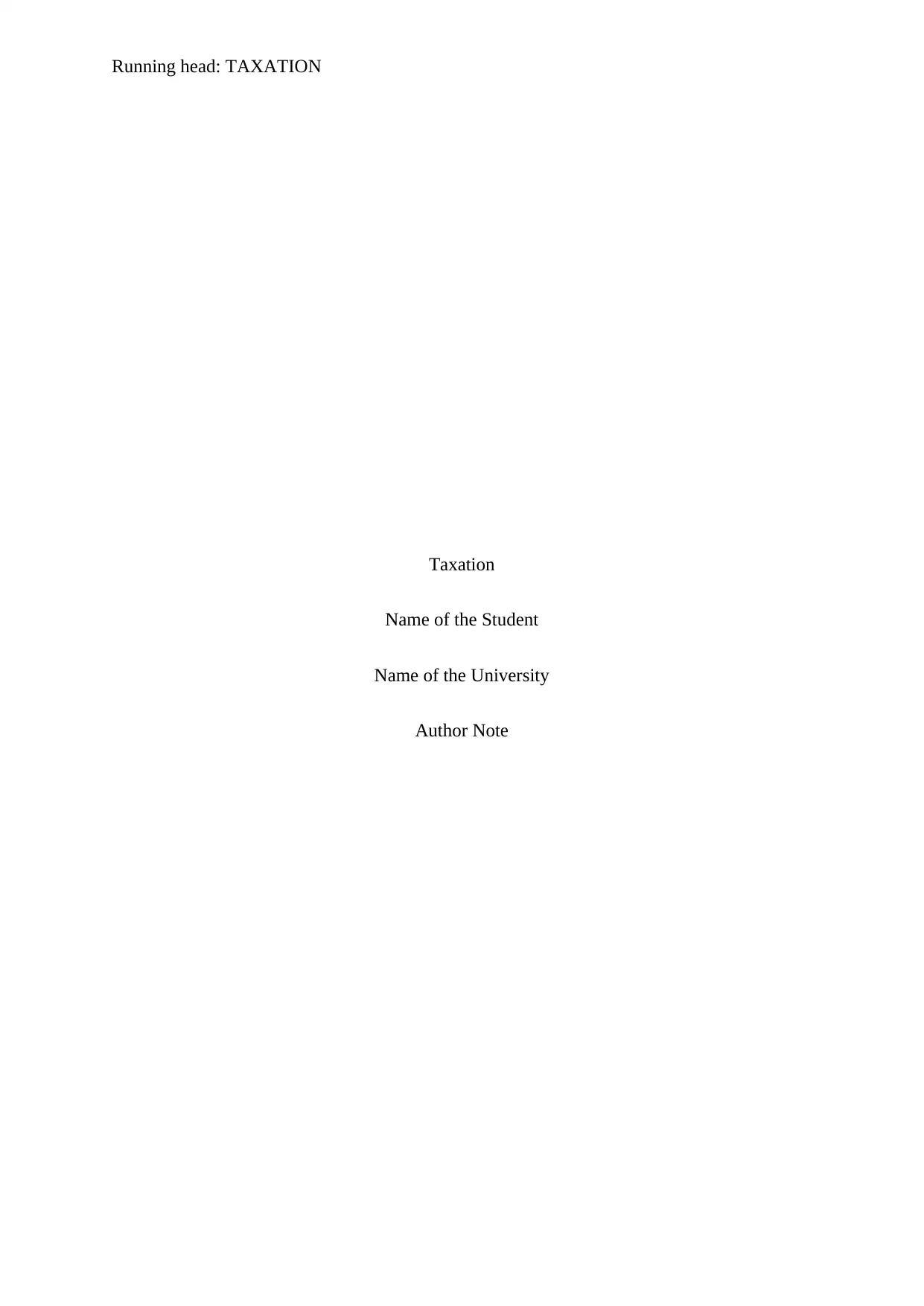
Running head: TAXATION
Taxation
Name of the Student
Name of the University
Author Note
Taxation
Name of the Student
Name of the University
Author Note
Paraphrase This Document
Need a fresh take? Get an instant paraphrase of this document with our AI Paraphraser
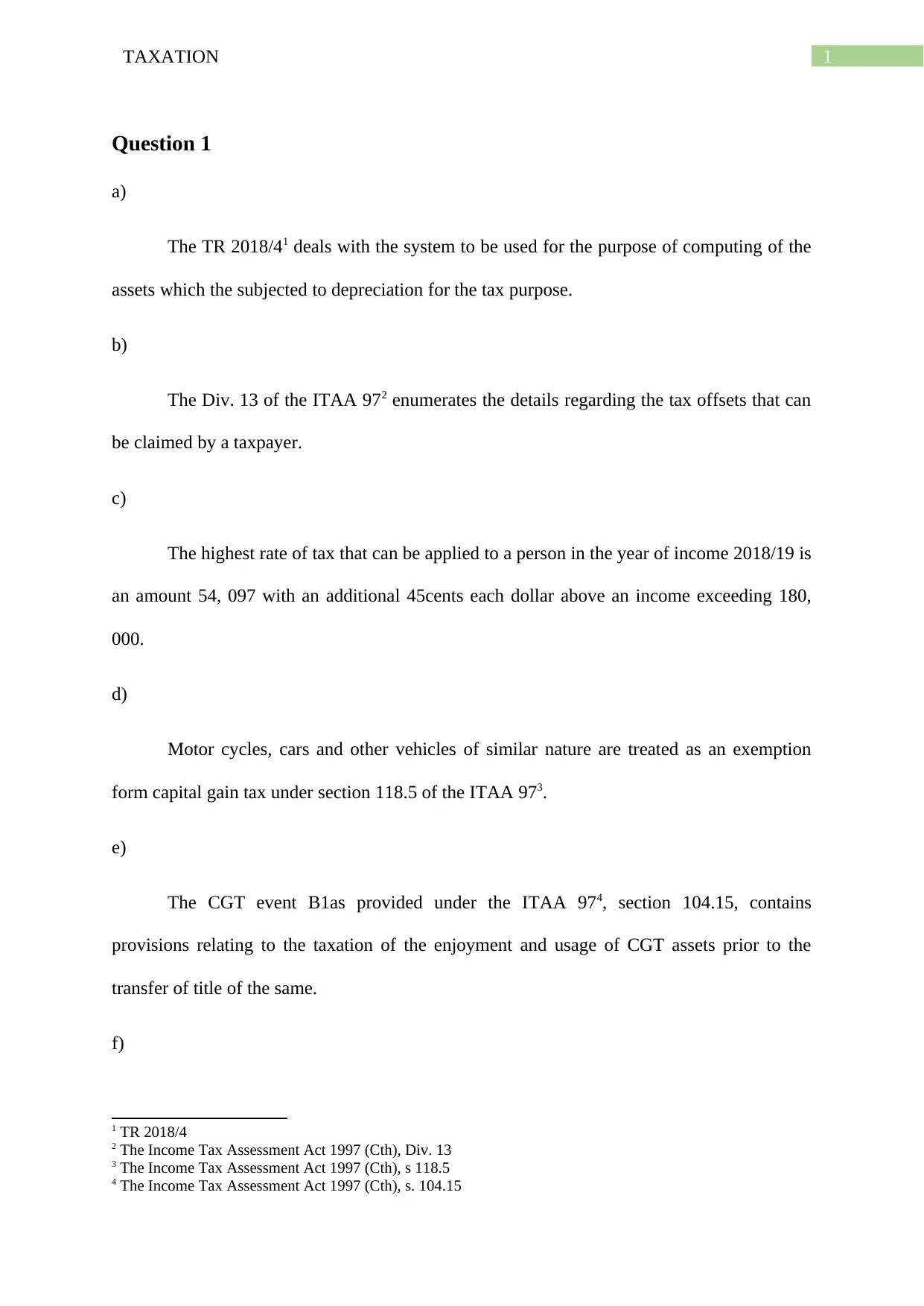
1TAXATION
Question 1
a)
The TR 2018/41 deals with the system to be used for the purpose of computing of the
assets which the subjected to depreciation for the tax purpose.
b)
The Div. 13 of the ITAA 972 enumerates the details regarding the tax offsets that can
be claimed by a taxpayer.
c)
The highest rate of tax that can be applied to a person in the year of income 2018/19 is
an amount 54, 097 with an additional 45cents each dollar above an income exceeding 180,
000.
d)
Motor cycles, cars and other vehicles of similar nature are treated as an exemption
form capital gain tax under section 118.5 of the ITAA 973.
e)
The CGT event B1as provided under the ITAA 974, section 104.15, contains
provisions relating to the taxation of the enjoyment and usage of CGT assets prior to the
transfer of title of the same.
f)
1 TR 2018/4
2 The Income Tax Assessment Act 1997 (Cth), Div. 13
3 The Income Tax Assessment Act 1997 (Cth), s 118.5
4 The Income Tax Assessment Act 1997 (Cth), s. 104.15
Question 1
a)
The TR 2018/41 deals with the system to be used for the purpose of computing of the
assets which the subjected to depreciation for the tax purpose.
b)
The Div. 13 of the ITAA 972 enumerates the details regarding the tax offsets that can
be claimed by a taxpayer.
c)
The highest rate of tax that can be applied to a person in the year of income 2018/19 is
an amount 54, 097 with an additional 45cents each dollar above an income exceeding 180,
000.
d)
Motor cycles, cars and other vehicles of similar nature are treated as an exemption
form capital gain tax under section 118.5 of the ITAA 973.
e)
The CGT event B1as provided under the ITAA 974, section 104.15, contains
provisions relating to the taxation of the enjoyment and usage of CGT assets prior to the
transfer of title of the same.
f)
1 TR 2018/4
2 The Income Tax Assessment Act 1997 (Cth), Div. 13
3 The Income Tax Assessment Act 1997 (Cth), s 118.5
4 The Income Tax Assessment Act 1997 (Cth), s. 104.15
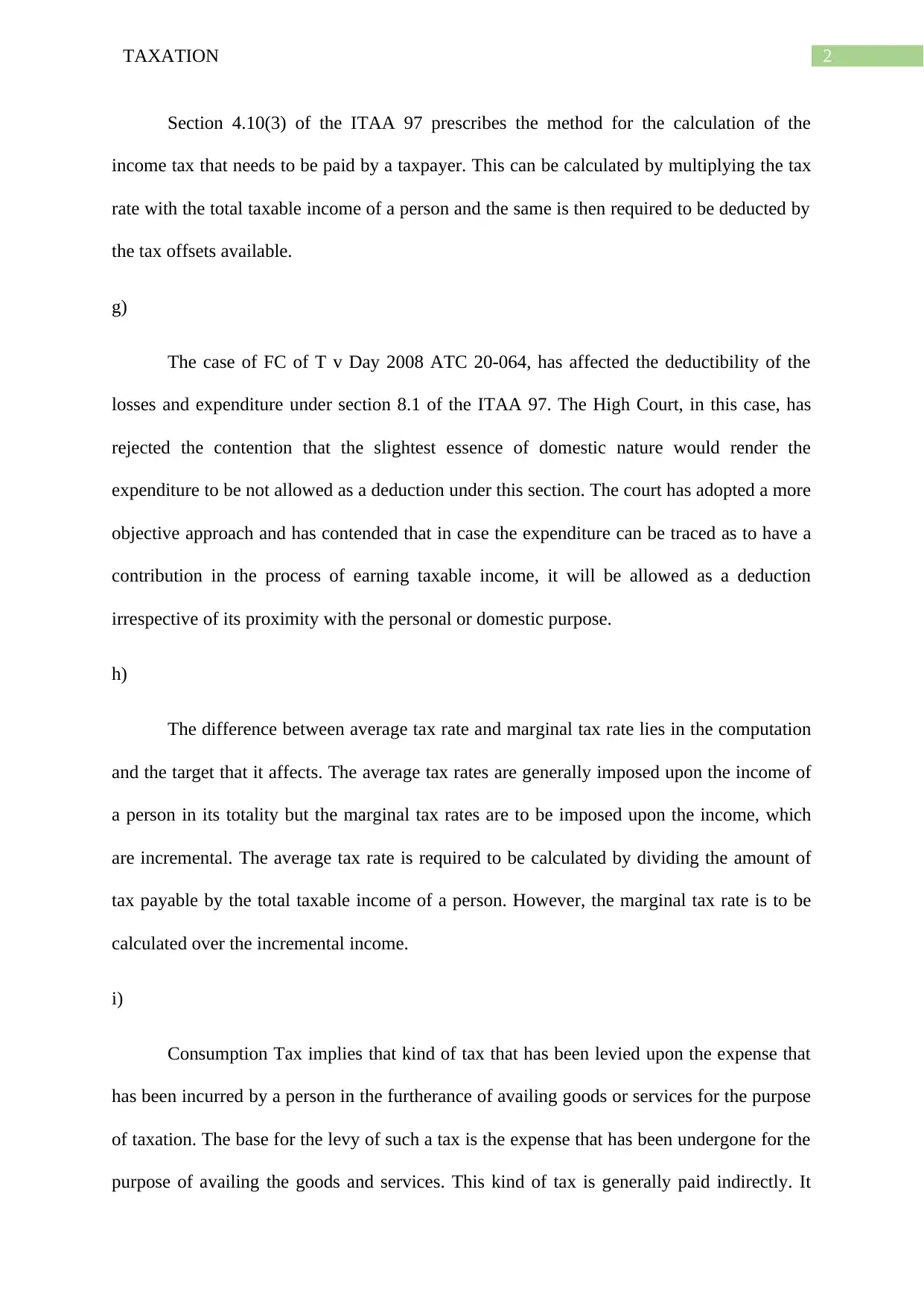
2TAXATION
Section 4.10(3) of the ITAA 97 prescribes the method for the calculation of the
income tax that needs to be paid by a taxpayer. This can be calculated by multiplying the tax
rate with the total taxable income of a person and the same is then required to be deducted by
the tax offsets available.
g)
The case of FC of T v Day 2008 ATC 20-064, has affected the deductibility of the
losses and expenditure under section 8.1 of the ITAA 97. The High Court, in this case, has
rejected the contention that the slightest essence of domestic nature would render the
expenditure to be not allowed as a deduction under this section. The court has adopted a more
objective approach and has contended that in case the expenditure can be traced as to have a
contribution in the process of earning taxable income, it will be allowed as a deduction
irrespective of its proximity with the personal or domestic purpose.
h)
The difference between average tax rate and marginal tax rate lies in the computation
and the target that it affects. The average tax rates are generally imposed upon the income of
a person in its totality but the marginal tax rates are to be imposed upon the income, which
are incremental. The average tax rate is required to be calculated by dividing the amount of
tax payable by the total taxable income of a person. However, the marginal tax rate is to be
calculated over the incremental income.
i)
Consumption Tax implies that kind of tax that has been levied upon the expense that
has been incurred by a person in the furtherance of availing goods or services for the purpose
of taxation. The base for the levy of such a tax is the expense that has been undergone for the
purpose of availing the goods and services. This kind of tax is generally paid indirectly. It
Section 4.10(3) of the ITAA 97 prescribes the method for the calculation of the
income tax that needs to be paid by a taxpayer. This can be calculated by multiplying the tax
rate with the total taxable income of a person and the same is then required to be deducted by
the tax offsets available.
g)
The case of FC of T v Day 2008 ATC 20-064, has affected the deductibility of the
losses and expenditure under section 8.1 of the ITAA 97. The High Court, in this case, has
rejected the contention that the slightest essence of domestic nature would render the
expenditure to be not allowed as a deduction under this section. The court has adopted a more
objective approach and has contended that in case the expenditure can be traced as to have a
contribution in the process of earning taxable income, it will be allowed as a deduction
irrespective of its proximity with the personal or domestic purpose.
h)
The difference between average tax rate and marginal tax rate lies in the computation
and the target that it affects. The average tax rates are generally imposed upon the income of
a person in its totality but the marginal tax rates are to be imposed upon the income, which
are incremental. The average tax rate is required to be calculated by dividing the amount of
tax payable by the total taxable income of a person. However, the marginal tax rate is to be
calculated over the incremental income.
i)
Consumption Tax implies that kind of tax that has been levied upon the expense that
has been incurred by a person in the furtherance of availing goods or services for the purpose
of taxation. The base for the levy of such a tax is the expense that has been undergone for the
purpose of availing the goods and services. This kind of tax is generally paid indirectly. It
⊘ This is a preview!⊘
Do you want full access?
Subscribe today to unlock all pages.

Trusted by 1+ million students worldwide
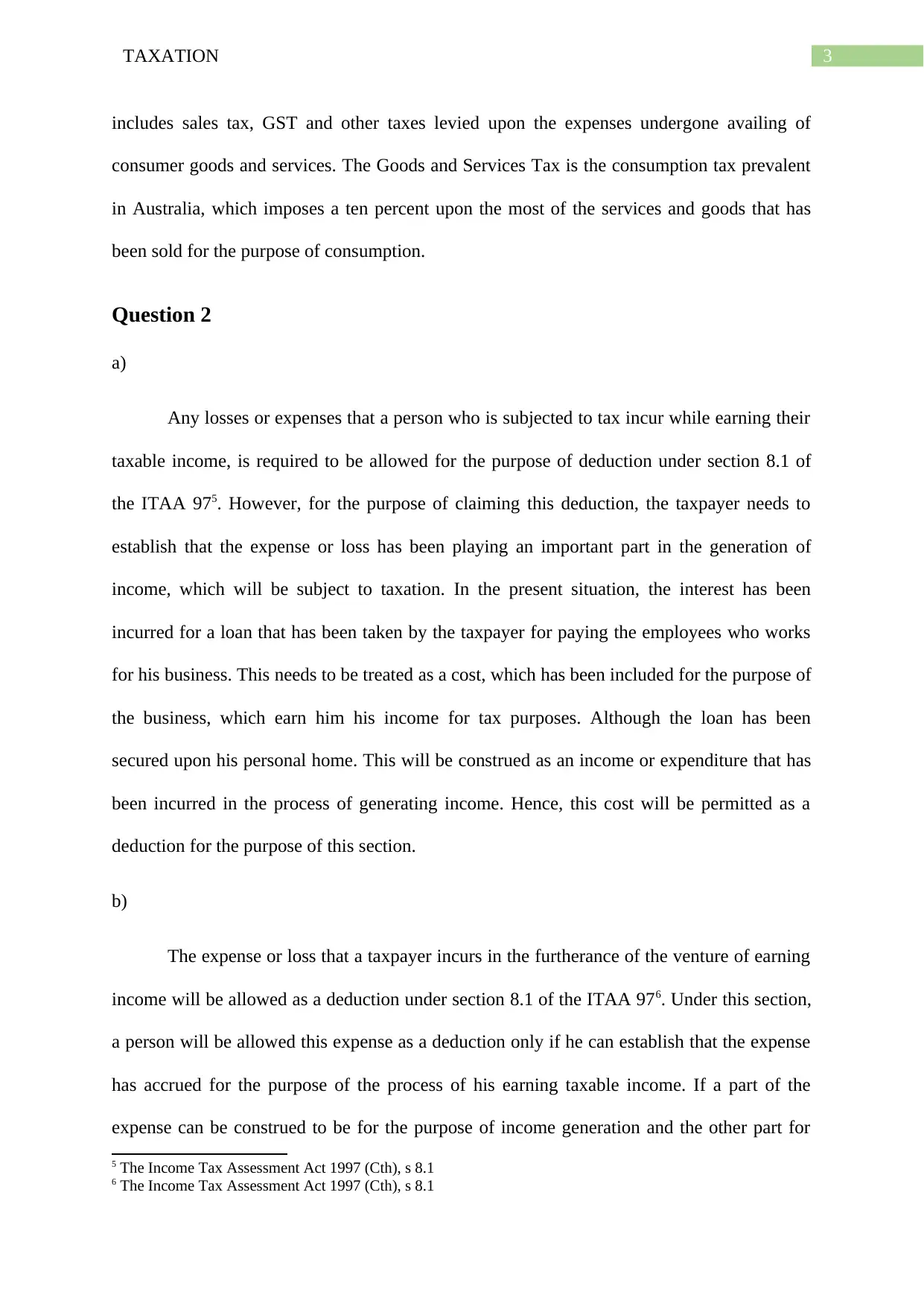
3TAXATION
includes sales tax, GST and other taxes levied upon the expenses undergone availing of
consumer goods and services. The Goods and Services Tax is the consumption tax prevalent
in Australia, which imposes a ten percent upon the most of the services and goods that has
been sold for the purpose of consumption.
Question 2
a)
Any losses or expenses that a person who is subjected to tax incur while earning their
taxable income, is required to be allowed for the purpose of deduction under section 8.1 of
the ITAA 975. However, for the purpose of claiming this deduction, the taxpayer needs to
establish that the expense or loss has been playing an important part in the generation of
income, which will be subject to taxation. In the present situation, the interest has been
incurred for a loan that has been taken by the taxpayer for paying the employees who works
for his business. This needs to be treated as a cost, which has been included for the purpose of
the business, which earn him his income for tax purposes. Although the loan has been
secured upon his personal home. This will be construed as an income or expenditure that has
been incurred in the process of generating income. Hence, this cost will be permitted as a
deduction for the purpose of this section.
b)
The expense or loss that a taxpayer incurs in the furtherance of the venture of earning
income will be allowed as a deduction under section 8.1 of the ITAA 976. Under this section,
a person will be allowed this expense as a deduction only if he can establish that the expense
has accrued for the purpose of the process of his earning taxable income. If a part of the
expense can be construed to be for the purpose of income generation and the other part for
5 The Income Tax Assessment Act 1997 (Cth), s 8.1
6 The Income Tax Assessment Act 1997 (Cth), s 8.1
includes sales tax, GST and other taxes levied upon the expenses undergone availing of
consumer goods and services. The Goods and Services Tax is the consumption tax prevalent
in Australia, which imposes a ten percent upon the most of the services and goods that has
been sold for the purpose of consumption.
Question 2
a)
Any losses or expenses that a person who is subjected to tax incur while earning their
taxable income, is required to be allowed for the purpose of deduction under section 8.1 of
the ITAA 975. However, for the purpose of claiming this deduction, the taxpayer needs to
establish that the expense or loss has been playing an important part in the generation of
income, which will be subject to taxation. In the present situation, the interest has been
incurred for a loan that has been taken by the taxpayer for paying the employees who works
for his business. This needs to be treated as a cost, which has been included for the purpose of
the business, which earn him his income for tax purposes. Although the loan has been
secured upon his personal home. This will be construed as an income or expenditure that has
been incurred in the process of generating income. Hence, this cost will be permitted as a
deduction for the purpose of this section.
b)
The expense or loss that a taxpayer incurs in the furtherance of the venture of earning
income will be allowed as a deduction under section 8.1 of the ITAA 976. Under this section,
a person will be allowed this expense as a deduction only if he can establish that the expense
has accrued for the purpose of the process of his earning taxable income. If a part of the
expense can be construed to be for the purpose of income generation and the other part for
5 The Income Tax Assessment Act 1997 (Cth), s 8.1
6 The Income Tax Assessment Act 1997 (Cth), s 8.1
Paraphrase This Document
Need a fresh take? Get an instant paraphrase of this document with our AI Paraphraser
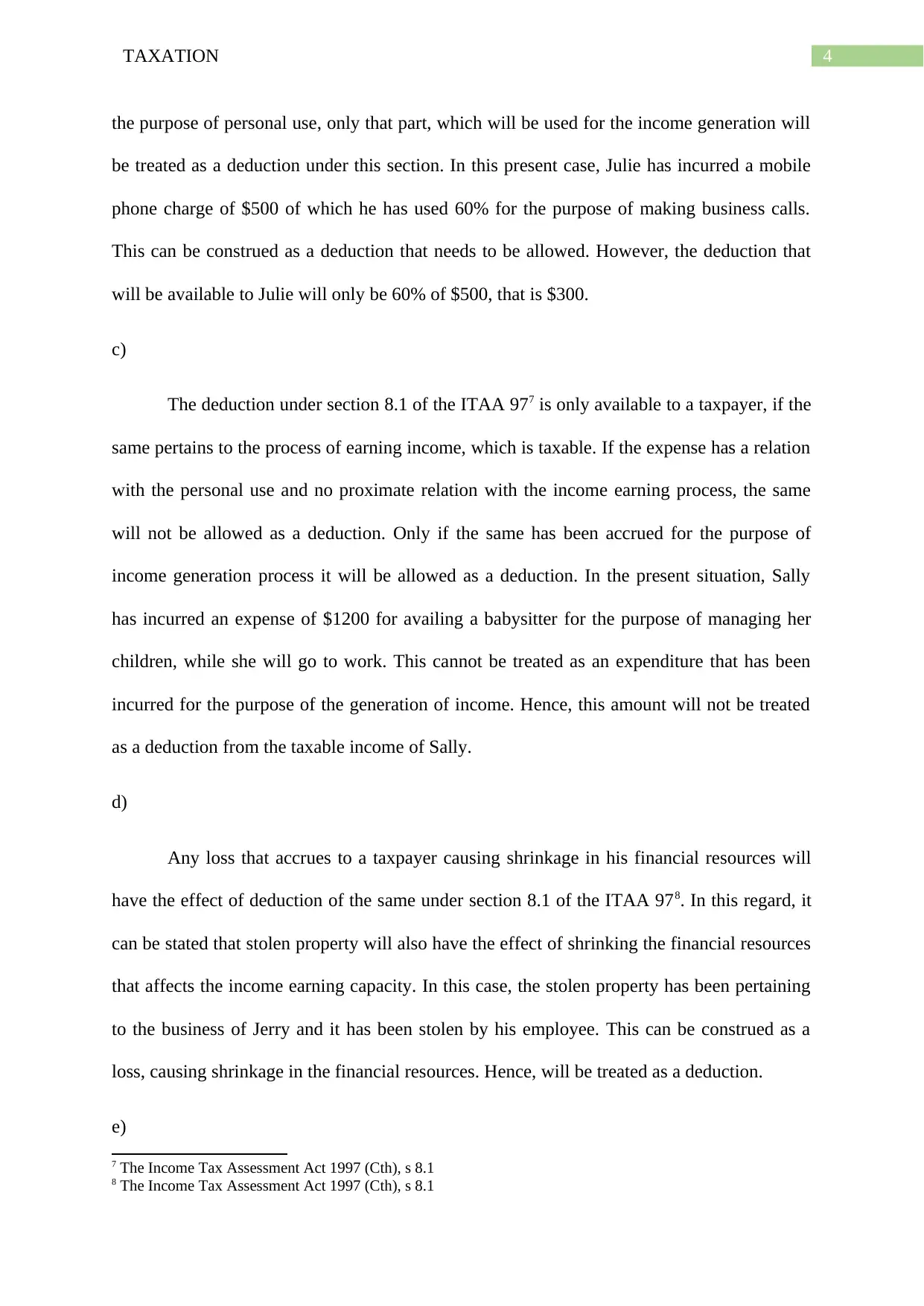
4TAXATION
the purpose of personal use, only that part, which will be used for the income generation will
be treated as a deduction under this section. In this present case, Julie has incurred a mobile
phone charge of $500 of which he has used 60% for the purpose of making business calls.
This can be construed as a deduction that needs to be allowed. However, the deduction that
will be available to Julie will only be 60% of $500, that is $300.
c)
The deduction under section 8.1 of the ITAA 977 is only available to a taxpayer, if the
same pertains to the process of earning income, which is taxable. If the expense has a relation
with the personal use and no proximate relation with the income earning process, the same
will not be allowed as a deduction. Only if the same has been accrued for the purpose of
income generation process it will be allowed as a deduction. In the present situation, Sally
has incurred an expense of $1200 for availing a babysitter for the purpose of managing her
children, while she will go to work. This cannot be treated as an expenditure that has been
incurred for the purpose of the generation of income. Hence, this amount will not be treated
as a deduction from the taxable income of Sally.
d)
Any loss that accrues to a taxpayer causing shrinkage in his financial resources will
have the effect of deduction of the same under section 8.1 of the ITAA 978. In this regard, it
can be stated that stolen property will also have the effect of shrinking the financial resources
that affects the income earning capacity. In this case, the stolen property has been pertaining
to the business of Jerry and it has been stolen by his employee. This can be construed as a
loss, causing shrinkage in the financial resources. Hence, will be treated as a deduction.
e)
7 The Income Tax Assessment Act 1997 (Cth), s 8.1
8 The Income Tax Assessment Act 1997 (Cth), s 8.1
the purpose of personal use, only that part, which will be used for the income generation will
be treated as a deduction under this section. In this present case, Julie has incurred a mobile
phone charge of $500 of which he has used 60% for the purpose of making business calls.
This can be construed as a deduction that needs to be allowed. However, the deduction that
will be available to Julie will only be 60% of $500, that is $300.
c)
The deduction under section 8.1 of the ITAA 977 is only available to a taxpayer, if the
same pertains to the process of earning income, which is taxable. If the expense has a relation
with the personal use and no proximate relation with the income earning process, the same
will not be allowed as a deduction. Only if the same has been accrued for the purpose of
income generation process it will be allowed as a deduction. In the present situation, Sally
has incurred an expense of $1200 for availing a babysitter for the purpose of managing her
children, while she will go to work. This cannot be treated as an expenditure that has been
incurred for the purpose of the generation of income. Hence, this amount will not be treated
as a deduction from the taxable income of Sally.
d)
Any loss that accrues to a taxpayer causing shrinkage in his financial resources will
have the effect of deduction of the same under section 8.1 of the ITAA 978. In this regard, it
can be stated that stolen property will also have the effect of shrinking the financial resources
that affects the income earning capacity. In this case, the stolen property has been pertaining
to the business of Jerry and it has been stolen by his employee. This can be construed as a
loss, causing shrinkage in the financial resources. Hence, will be treated as a deduction.
e)
7 The Income Tax Assessment Act 1997 (Cth), s 8.1
8 The Income Tax Assessment Act 1997 (Cth), s 8.1
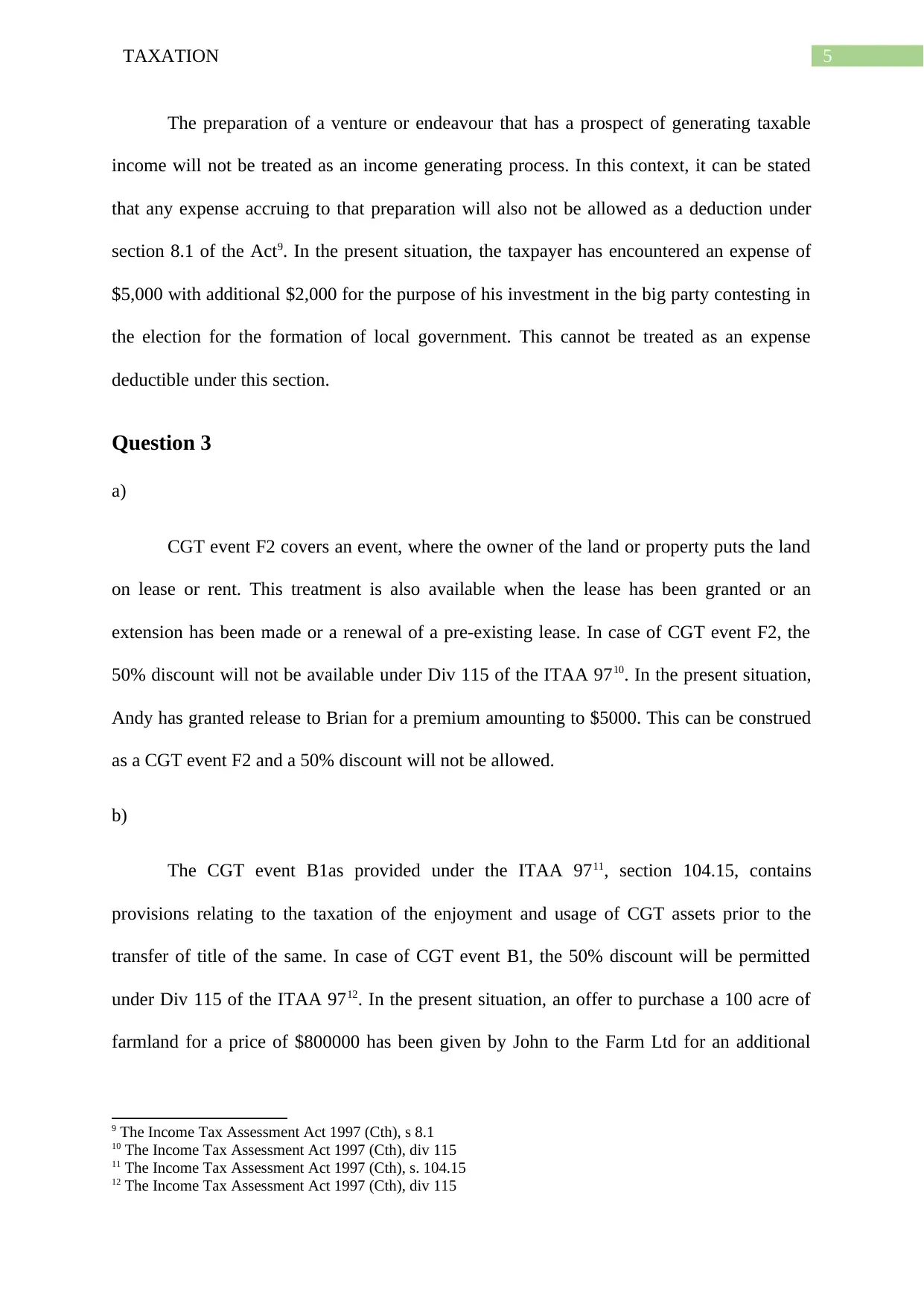
5TAXATION
The preparation of a venture or endeavour that has a prospect of generating taxable
income will not be treated as an income generating process. In this context, it can be stated
that any expense accruing to that preparation will also not be allowed as a deduction under
section 8.1 of the Act9. In the present situation, the taxpayer has encountered an expense of
$5,000 with additional $2,000 for the purpose of his investment in the big party contesting in
the election for the formation of local government. This cannot be treated as an expense
deductible under this section.
Question 3
a)
CGT event F2 covers an event, where the owner of the land or property puts the land
on lease or rent. This treatment is also available when the lease has been granted or an
extension has been made or a renewal of a pre-existing lease. In case of CGT event F2, the
50% discount will not be available under Div 115 of the ITAA 9710. In the present situation,
Andy has granted release to Brian for a premium amounting to $5000. This can be construed
as a CGT event F2 and a 50% discount will not be allowed.
b)
The CGT event B1as provided under the ITAA 9711, section 104.15, contains
provisions relating to the taxation of the enjoyment and usage of CGT assets prior to the
transfer of title of the same. In case of CGT event B1, the 50% discount will be permitted
under Div 115 of the ITAA 9712. In the present situation, an offer to purchase a 100 acre of
farmland for a price of $800000 has been given by John to the Farm Ltd for an additional
9 The Income Tax Assessment Act 1997 (Cth), s 8.1
10 The Income Tax Assessment Act 1997 (Cth), div 115
11 The Income Tax Assessment Act 1997 (Cth), s. 104.15
12 The Income Tax Assessment Act 1997 (Cth), div 115
The preparation of a venture or endeavour that has a prospect of generating taxable
income will not be treated as an income generating process. In this context, it can be stated
that any expense accruing to that preparation will also not be allowed as a deduction under
section 8.1 of the Act9. In the present situation, the taxpayer has encountered an expense of
$5,000 with additional $2,000 for the purpose of his investment in the big party contesting in
the election for the formation of local government. This cannot be treated as an expense
deductible under this section.
Question 3
a)
CGT event F2 covers an event, where the owner of the land or property puts the land
on lease or rent. This treatment is also available when the lease has been granted or an
extension has been made or a renewal of a pre-existing lease. In case of CGT event F2, the
50% discount will not be available under Div 115 of the ITAA 9710. In the present situation,
Andy has granted release to Brian for a premium amounting to $5000. This can be construed
as a CGT event F2 and a 50% discount will not be allowed.
b)
The CGT event B1as provided under the ITAA 9711, section 104.15, contains
provisions relating to the taxation of the enjoyment and usage of CGT assets prior to the
transfer of title of the same. In case of CGT event B1, the 50% discount will be permitted
under Div 115 of the ITAA 9712. In the present situation, an offer to purchase a 100 acre of
farmland for a price of $800000 has been given by John to the Farm Ltd for an additional
9 The Income Tax Assessment Act 1997 (Cth), s 8.1
10 The Income Tax Assessment Act 1997 (Cth), div 115
11 The Income Tax Assessment Act 1997 (Cth), s. 104.15
12 The Income Tax Assessment Act 1997 (Cth), div 115
⊘ This is a preview!⊘
Do you want full access?
Subscribe today to unlock all pages.

Trusted by 1+ million students worldwide
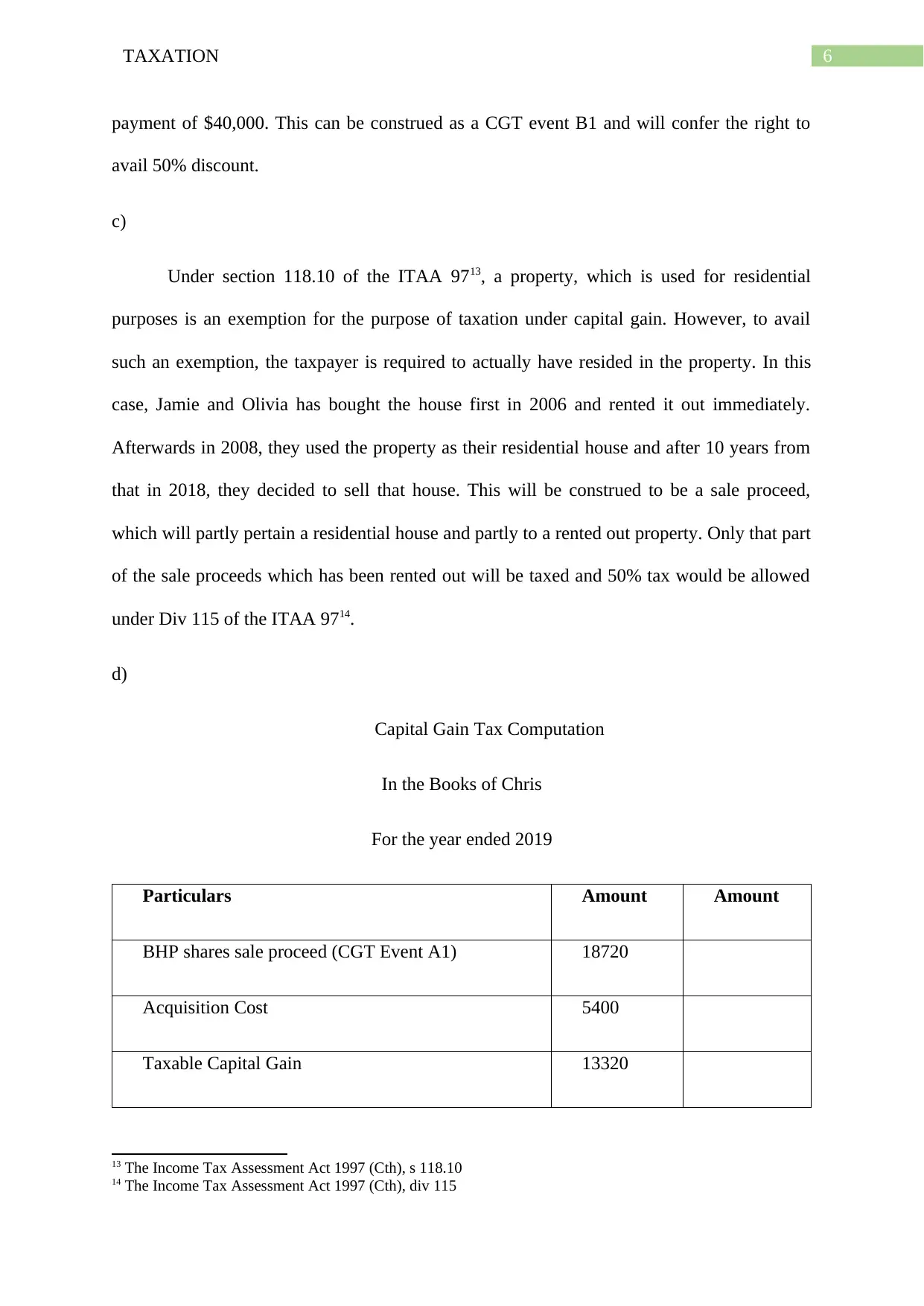
6TAXATION
payment of $40,000. This can be construed as a CGT event B1 and will confer the right to
avail 50% discount.
c)
Under section 118.10 of the ITAA 9713, a property, which is used for residential
purposes is an exemption for the purpose of taxation under capital gain. However, to avail
such an exemption, the taxpayer is required to actually have resided in the property. In this
case, Jamie and Olivia has bought the house first in 2006 and rented it out immediately.
Afterwards in 2008, they used the property as their residential house and after 10 years from
that in 2018, they decided to sell that house. This will be construed to be a sale proceed,
which will partly pertain a residential house and partly to a rented out property. Only that part
of the sale proceeds which has been rented out will be taxed and 50% tax would be allowed
under Div 115 of the ITAA 9714.
d)
Capital Gain Tax Computation
In the Books of Chris
For the year ended 2019
Particulars Amount Amount
BHP shares sale proceed (CGT Event A1) 18720
Acquisition Cost 5400
Taxable Capital Gain 13320
13 The Income Tax Assessment Act 1997 (Cth), s 118.10
14 The Income Tax Assessment Act 1997 (Cth), div 115
payment of $40,000. This can be construed as a CGT event B1 and will confer the right to
avail 50% discount.
c)
Under section 118.10 of the ITAA 9713, a property, which is used for residential
purposes is an exemption for the purpose of taxation under capital gain. However, to avail
such an exemption, the taxpayer is required to actually have resided in the property. In this
case, Jamie and Olivia has bought the house first in 2006 and rented it out immediately.
Afterwards in 2008, they used the property as their residential house and after 10 years from
that in 2018, they decided to sell that house. This will be construed to be a sale proceed,
which will partly pertain a residential house and partly to a rented out property. Only that part
of the sale proceeds which has been rented out will be taxed and 50% tax would be allowed
under Div 115 of the ITAA 9714.
d)
Capital Gain Tax Computation
In the Books of Chris
For the year ended 2019
Particulars Amount Amount
BHP shares sale proceed (CGT Event A1) 18720
Acquisition Cost 5400
Taxable Capital Gain 13320
13 The Income Tax Assessment Act 1997 (Cth), s 118.10
14 The Income Tax Assessment Act 1997 (Cth), div 115
Paraphrase This Document
Need a fresh take? Get an instant paraphrase of this document with our AI Paraphraser
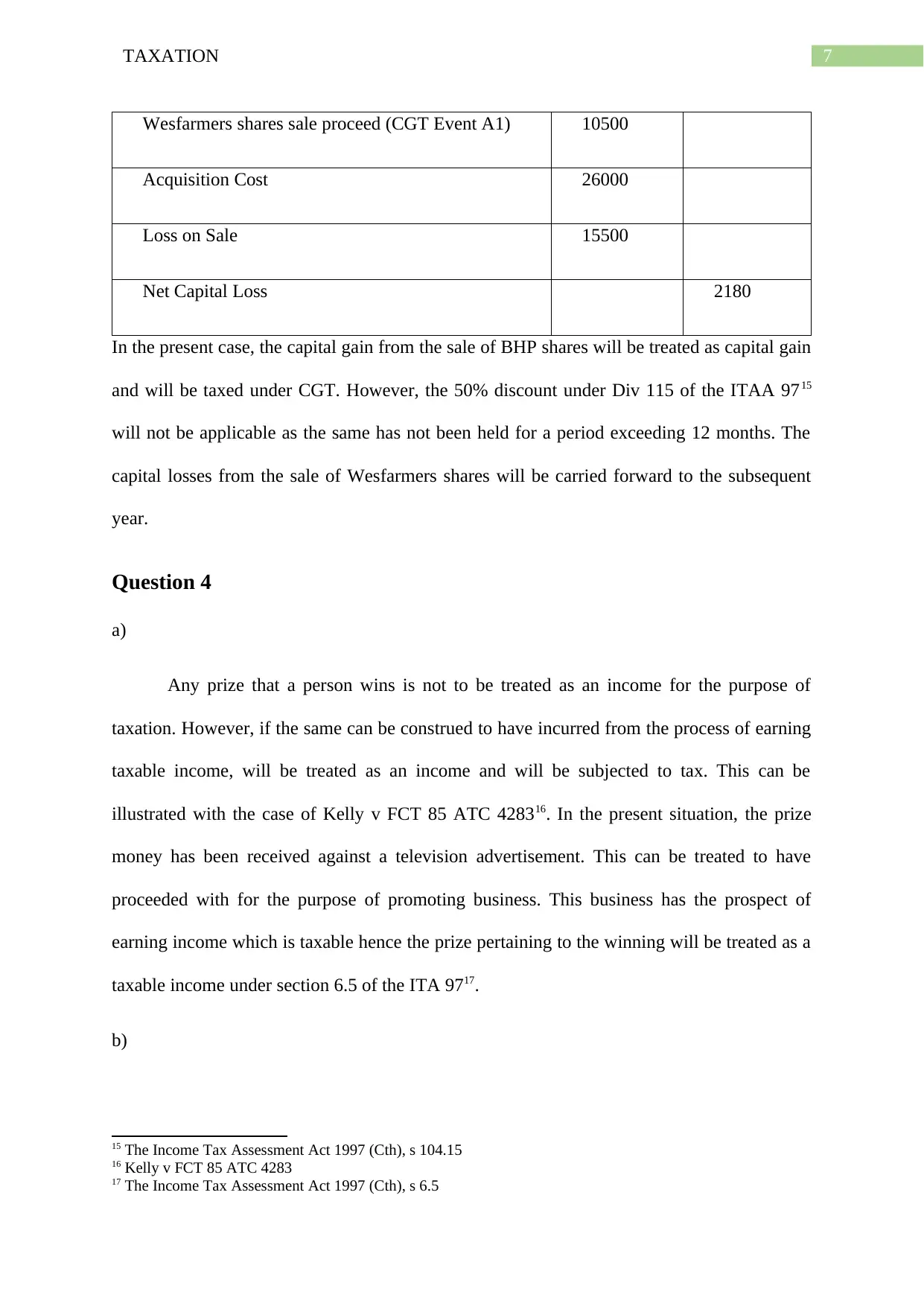
7TAXATION
Wesfarmers shares sale proceed (CGT Event A1) 10500
Acquisition Cost 26000
Loss on Sale 15500
Net Capital Loss 2180
In the present case, the capital gain from the sale of BHP shares will be treated as capital gain
and will be taxed under CGT. However, the 50% discount under Div 115 of the ITAA 9715
will not be applicable as the same has not been held for a period exceeding 12 months. The
capital losses from the sale of Wesfarmers shares will be carried forward to the subsequent
year.
Question 4
a)
Any prize that a person wins is not to be treated as an income for the purpose of
taxation. However, if the same can be construed to have incurred from the process of earning
taxable income, will be treated as an income and will be subjected to tax. This can be
illustrated with the case of Kelly v FCT 85 ATC 428316. In the present situation, the prize
money has been received against a television advertisement. This can be treated to have
proceeded with for the purpose of promoting business. This business has the prospect of
earning income which is taxable hence the prize pertaining to the winning will be treated as a
taxable income under section 6.5 of the ITA 9717.
b)
15 The Income Tax Assessment Act 1997 (Cth), s 104.15
16 Kelly v FCT 85 ATC 4283
17 The Income Tax Assessment Act 1997 (Cth), s 6.5
Wesfarmers shares sale proceed (CGT Event A1) 10500
Acquisition Cost 26000
Loss on Sale 15500
Net Capital Loss 2180
In the present case, the capital gain from the sale of BHP shares will be treated as capital gain
and will be taxed under CGT. However, the 50% discount under Div 115 of the ITAA 9715
will not be applicable as the same has not been held for a period exceeding 12 months. The
capital losses from the sale of Wesfarmers shares will be carried forward to the subsequent
year.
Question 4
a)
Any prize that a person wins is not to be treated as an income for the purpose of
taxation. However, if the same can be construed to have incurred from the process of earning
taxable income, will be treated as an income and will be subjected to tax. This can be
illustrated with the case of Kelly v FCT 85 ATC 428316. In the present situation, the prize
money has been received against a television advertisement. This can be treated to have
proceeded with for the purpose of promoting business. This business has the prospect of
earning income which is taxable hence the prize pertaining to the winning will be treated as a
taxable income under section 6.5 of the ITA 9717.
b)
15 The Income Tax Assessment Act 1997 (Cth), s 104.15
16 Kelly v FCT 85 ATC 4283
17 The Income Tax Assessment Act 1997 (Cth), s 6.5
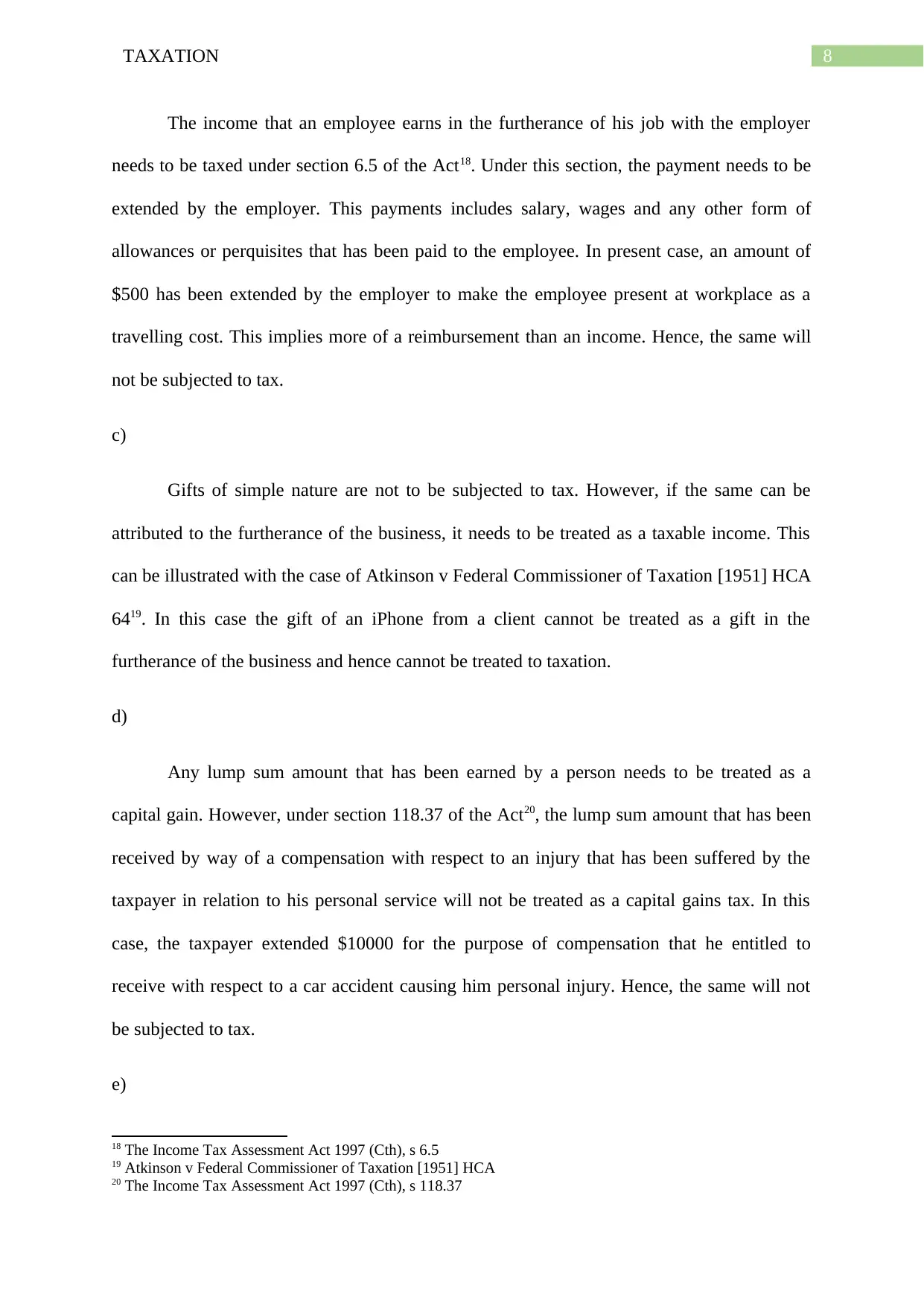
8TAXATION
The income that an employee earns in the furtherance of his job with the employer
needs to be taxed under section 6.5 of the Act18. Under this section, the payment needs to be
extended by the employer. This payments includes salary, wages and any other form of
allowances or perquisites that has been paid to the employee. In present case, an amount of
$500 has been extended by the employer to make the employee present at workplace as a
travelling cost. This implies more of a reimbursement than an income. Hence, the same will
not be subjected to tax.
c)
Gifts of simple nature are not to be subjected to tax. However, if the same can be
attributed to the furtherance of the business, it needs to be treated as a taxable income. This
can be illustrated with the case of Atkinson v Federal Commissioner of Taxation [1951] HCA
6419. In this case the gift of an iPhone from a client cannot be treated as a gift in the
furtherance of the business and hence cannot be treated to taxation.
d)
Any lump sum amount that has been earned by a person needs to be treated as a
capital gain. However, under section 118.37 of the Act20, the lump sum amount that has been
received by way of a compensation with respect to an injury that has been suffered by the
taxpayer in relation to his personal service will not be treated as a capital gains tax. In this
case, the taxpayer extended $10000 for the purpose of compensation that he entitled to
receive with respect to a car accident causing him personal injury. Hence, the same will not
be subjected to tax.
e)
18 The Income Tax Assessment Act 1997 (Cth), s 6.5
19 Atkinson v Federal Commissioner of Taxation [1951] HCA
20 The Income Tax Assessment Act 1997 (Cth), s 118.37
The income that an employee earns in the furtherance of his job with the employer
needs to be taxed under section 6.5 of the Act18. Under this section, the payment needs to be
extended by the employer. This payments includes salary, wages and any other form of
allowances or perquisites that has been paid to the employee. In present case, an amount of
$500 has been extended by the employer to make the employee present at workplace as a
travelling cost. This implies more of a reimbursement than an income. Hence, the same will
not be subjected to tax.
c)
Gifts of simple nature are not to be subjected to tax. However, if the same can be
attributed to the furtherance of the business, it needs to be treated as a taxable income. This
can be illustrated with the case of Atkinson v Federal Commissioner of Taxation [1951] HCA
6419. In this case the gift of an iPhone from a client cannot be treated as a gift in the
furtherance of the business and hence cannot be treated to taxation.
d)
Any lump sum amount that has been earned by a person needs to be treated as a
capital gain. However, under section 118.37 of the Act20, the lump sum amount that has been
received by way of a compensation with respect to an injury that has been suffered by the
taxpayer in relation to his personal service will not be treated as a capital gains tax. In this
case, the taxpayer extended $10000 for the purpose of compensation that he entitled to
receive with respect to a car accident causing him personal injury. Hence, the same will not
be subjected to tax.
e)
18 The Income Tax Assessment Act 1997 (Cth), s 6.5
19 Atkinson v Federal Commissioner of Taxation [1951] HCA
20 The Income Tax Assessment Act 1997 (Cth), s 118.37
⊘ This is a preview!⊘
Do you want full access?
Subscribe today to unlock all pages.

Trusted by 1+ million students worldwide
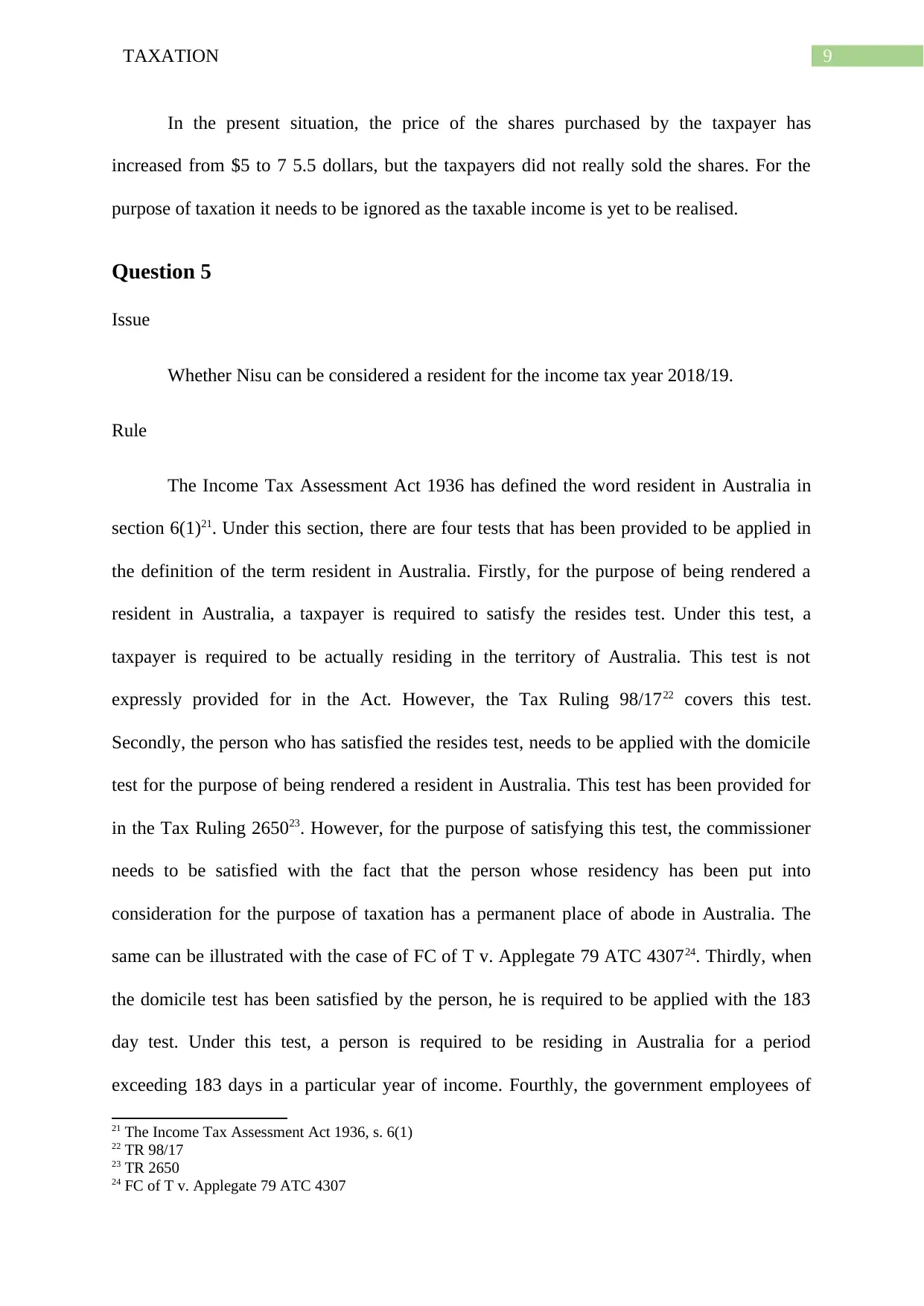
9TAXATION
In the present situation, the price of the shares purchased by the taxpayer has
increased from $5 to 7 5.5 dollars, but the taxpayers did not really sold the shares. For the
purpose of taxation it needs to be ignored as the taxable income is yet to be realised.
Question 5
Issue
Whether Nisu can be considered a resident for the income tax year 2018/19.
Rule
The Income Tax Assessment Act 1936 has defined the word resident in Australia in
section 6(1)21. Under this section, there are four tests that has been provided to be applied in
the definition of the term resident in Australia. Firstly, for the purpose of being rendered a
resident in Australia, a taxpayer is required to satisfy the resides test. Under this test, a
taxpayer is required to be actually residing in the territory of Australia. This test is not
expressly provided for in the Act. However, the Tax Ruling 98/1722 covers this test.
Secondly, the person who has satisfied the resides test, needs to be applied with the domicile
test for the purpose of being rendered a resident in Australia. This test has been provided for
in the Tax Ruling 265023. However, for the purpose of satisfying this test, the commissioner
needs to be satisfied with the fact that the person whose residency has been put into
consideration for the purpose of taxation has a permanent place of abode in Australia. The
same can be illustrated with the case of FC of T v. Applegate 79 ATC 430724. Thirdly, when
the domicile test has been satisfied by the person, he is required to be applied with the 183
day test. Under this test, a person is required to be residing in Australia for a period
exceeding 183 days in a particular year of income. Fourthly, the government employees of
21 The Income Tax Assessment Act 1936, s. 6(1)
22 TR 98/17
23 TR 2650
24 FC of T v. Applegate 79 ATC 4307
In the present situation, the price of the shares purchased by the taxpayer has
increased from $5 to 7 5.5 dollars, but the taxpayers did not really sold the shares. For the
purpose of taxation it needs to be ignored as the taxable income is yet to be realised.
Question 5
Issue
Whether Nisu can be considered a resident for the income tax year 2018/19.
Rule
The Income Tax Assessment Act 1936 has defined the word resident in Australia in
section 6(1)21. Under this section, there are four tests that has been provided to be applied in
the definition of the term resident in Australia. Firstly, for the purpose of being rendered a
resident in Australia, a taxpayer is required to satisfy the resides test. Under this test, a
taxpayer is required to be actually residing in the territory of Australia. This test is not
expressly provided for in the Act. However, the Tax Ruling 98/1722 covers this test.
Secondly, the person who has satisfied the resides test, needs to be applied with the domicile
test for the purpose of being rendered a resident in Australia. This test has been provided for
in the Tax Ruling 265023. However, for the purpose of satisfying this test, the commissioner
needs to be satisfied with the fact that the person whose residency has been put into
consideration for the purpose of taxation has a permanent place of abode in Australia. The
same can be illustrated with the case of FC of T v. Applegate 79 ATC 430724. Thirdly, when
the domicile test has been satisfied by the person, he is required to be applied with the 183
day test. Under this test, a person is required to be residing in Australia for a period
exceeding 183 days in a particular year of income. Fourthly, the government employees of
21 The Income Tax Assessment Act 1936, s. 6(1)
22 TR 98/17
23 TR 2650
24 FC of T v. Applegate 79 ATC 4307
Paraphrase This Document
Need a fresh take? Get an instant paraphrase of this document with our AI Paraphraser
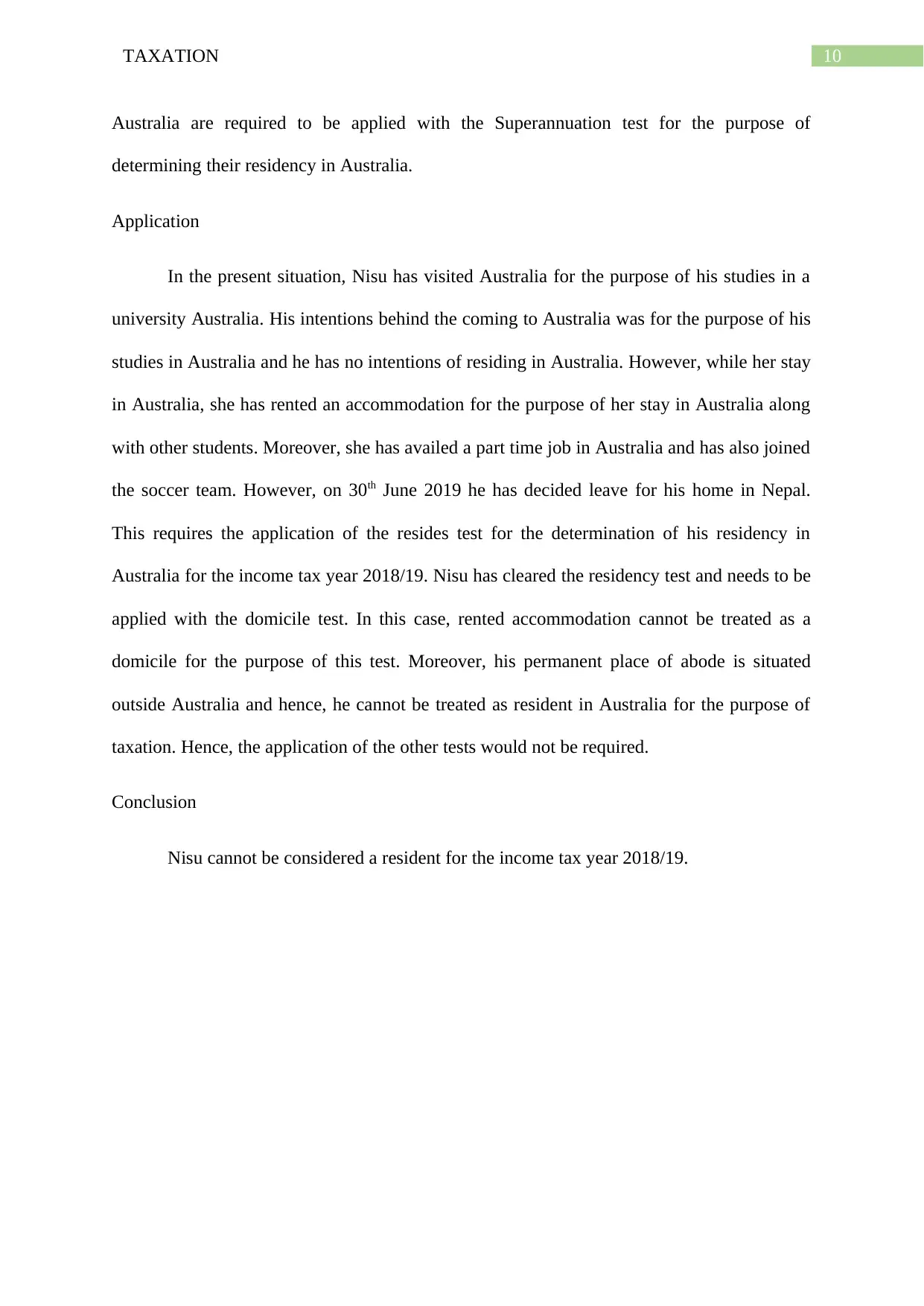
10TAXATION
Australia are required to be applied with the Superannuation test for the purpose of
determining their residency in Australia.
Application
In the present situation, Nisu has visited Australia for the purpose of his studies in a
university Australia. His intentions behind the coming to Australia was for the purpose of his
studies in Australia and he has no intentions of residing in Australia. However, while her stay
in Australia, she has rented an accommodation for the purpose of her stay in Australia along
with other students. Moreover, she has availed a part time job in Australia and has also joined
the soccer team. However, on 30th June 2019 he has decided leave for his home in Nepal.
This requires the application of the resides test for the determination of his residency in
Australia for the income tax year 2018/19. Nisu has cleared the residency test and needs to be
applied with the domicile test. In this case, rented accommodation cannot be treated as a
domicile for the purpose of this test. Moreover, his permanent place of abode is situated
outside Australia and hence, he cannot be treated as resident in Australia for the purpose of
taxation. Hence, the application of the other tests would not be required.
Conclusion
Nisu cannot be considered a resident for the income tax year 2018/19.
Australia are required to be applied with the Superannuation test for the purpose of
determining their residency in Australia.
Application
In the present situation, Nisu has visited Australia for the purpose of his studies in a
university Australia. His intentions behind the coming to Australia was for the purpose of his
studies in Australia and he has no intentions of residing in Australia. However, while her stay
in Australia, she has rented an accommodation for the purpose of her stay in Australia along
with other students. Moreover, she has availed a part time job in Australia and has also joined
the soccer team. However, on 30th June 2019 he has decided leave for his home in Nepal.
This requires the application of the resides test for the determination of his residency in
Australia for the income tax year 2018/19. Nisu has cleared the residency test and needs to be
applied with the domicile test. In this case, rented accommodation cannot be treated as a
domicile for the purpose of this test. Moreover, his permanent place of abode is situated
outside Australia and hence, he cannot be treated as resident in Australia for the purpose of
taxation. Hence, the application of the other tests would not be required.
Conclusion
Nisu cannot be considered a resident for the income tax year 2018/19.
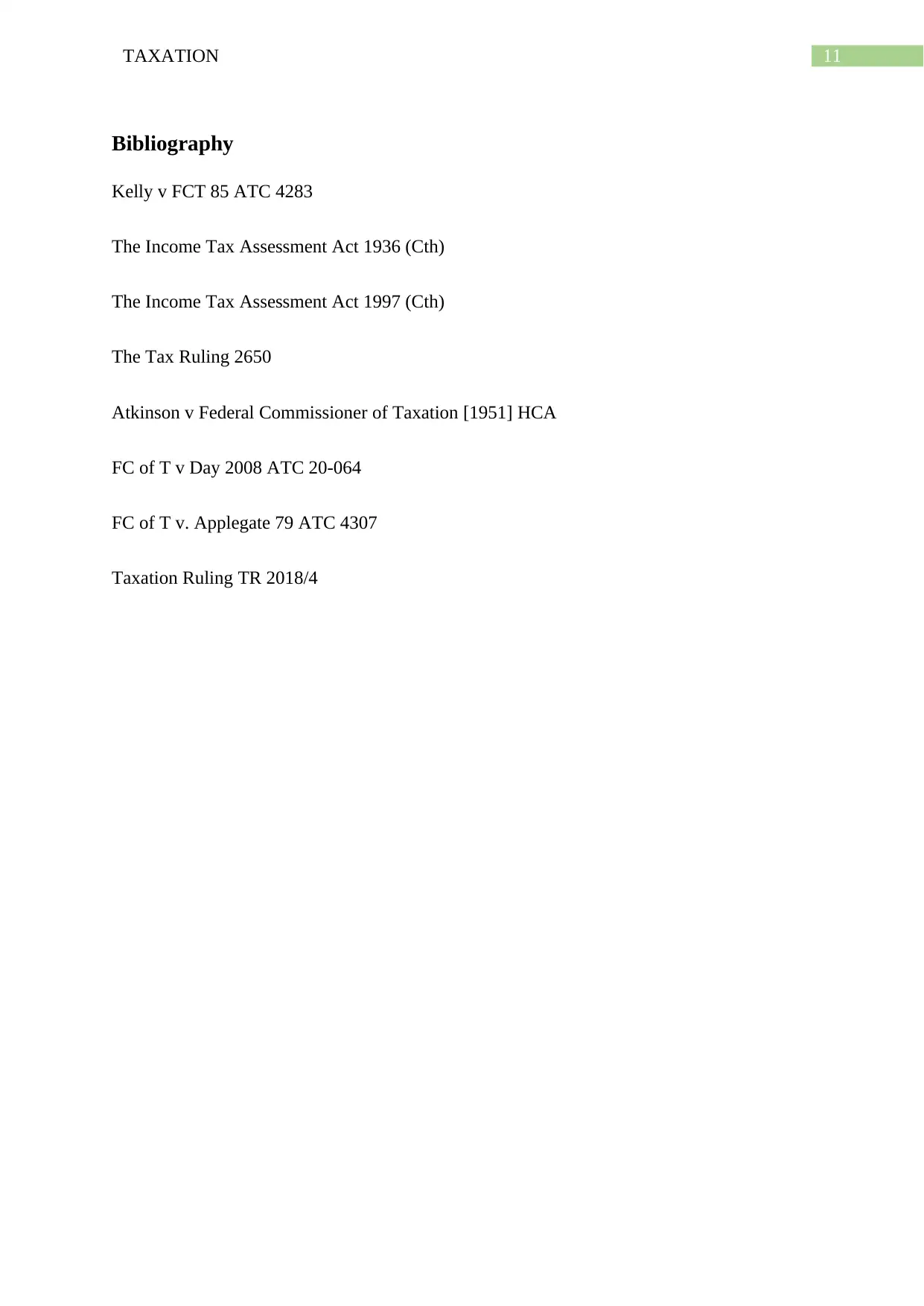
11TAXATION
Bibliography
Kelly v FCT 85 ATC 4283
The Income Tax Assessment Act 1936 (Cth)
The Income Tax Assessment Act 1997 (Cth)
The Tax Ruling 2650
Atkinson v Federal Commissioner of Taxation [1951] HCA
FC of T v Day 2008 ATC 20-064
FC of T v. Applegate 79 ATC 4307
Taxation Ruling TR 2018/4
Bibliography
Kelly v FCT 85 ATC 4283
The Income Tax Assessment Act 1936 (Cth)
The Income Tax Assessment Act 1997 (Cth)
The Tax Ruling 2650
Atkinson v Federal Commissioner of Taxation [1951] HCA
FC of T v Day 2008 ATC 20-064
FC of T v. Applegate 79 ATC 4307
Taxation Ruling TR 2018/4
⊘ This is a preview!⊘
Do you want full access?
Subscribe today to unlock all pages.

Trusted by 1+ million students worldwide
1 out of 12
Related Documents
Your All-in-One AI-Powered Toolkit for Academic Success.
+13062052269
info@desklib.com
Available 24*7 on WhatsApp / Email
![[object Object]](/_next/static/media/star-bottom.7253800d.svg)
Unlock your academic potential
Copyright © 2020–2026 A2Z Services. All Rights Reserved. Developed and managed by ZUCOL.





